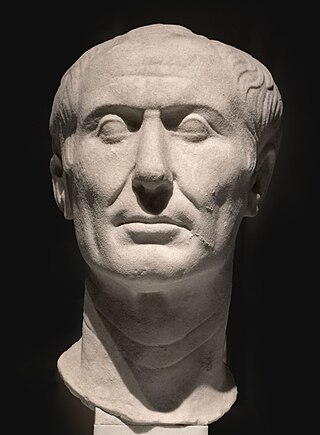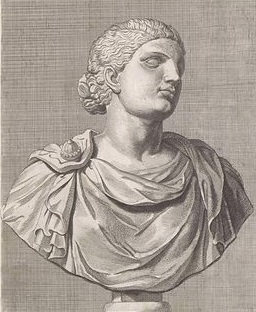Related Research Articles

Gaius Julius Caesar was a Roman general and statesman. A member of the First Triumvirate, Caesar led the Roman armies in the Gallic Wars before defeating his political rival Pompey in a civil war, and subsequently became dictator from 49 BC until his assassination in 44 BC. He played a critical role in the events that led to the demise of the Roman Republic and the rise of the Roman Empire.
80s BC is the time period from 89 BC – 80 BC.
Lucius Cornelius Cinna was a four-time consul of the Roman republic. Opposing Sulla's march on Rome in 88 BC, he was elected to the consulship of 87 BC, during which he engaged in an armed conflict – the Bellum Octavianum – with his co-consul, Gnaeus Octavius. Emerging victorious, Cinna initiated with his ally, Gaius Marius, extrajudicial killings of their personal enemies. In the aftermath, he dominated the republic for the next three years, serving continuously as consul.

Year 87 BC was a year of the pre-Julian Roman calendar. At the time it was known as the Year of the Consulship of Octavius and Cinna/Merula and the Second Year of Houyuan. The denomination 87 BC for this year has been used since the early medieval period, when the Anno Domini calendar era became the prevalent method in Europe for naming years.

The gens Julia was one of the most prominent patrician families in ancient Rome. Members of the gens attained the highest dignities of the state in the earliest times of the Republic. The first of the family to obtain the consulship was Gaius Julius Iulus in 489 BC. The gens is perhaps best known, however, for Gaius Julius Caesar, the dictator and grand uncle of the emperor Augustus, through whom the name was passed to the so-called Julio-Claudian dynasty of the first century AD. The nomen Julius became very common in imperial times, as the descendants of persons enrolled as citizens under the early emperors began to make their mark in history.

In ancient Roman religion, the flamen Dialis was the high priest of Jupiter. The term Dialis is related to Diespiter, an Old Latin form of the name Jupiter. There were 15 flamines, of whom three were flamines maiores, serving the three gods of the Archaic Triad. According to tradition the flamines were forbidden to touch metal, ride a horse, or see a corpse. The Flamen Dialis was officially ranked second in the ranking of the highest Roman priests, behind only the rex sacrorum and before another flamines maiores and pontifex maximus.
Lucius Aurelius Cotta was a Roman politician from an old noble family who held the offices of praetor, consul and censor. Both his father and grandfather of the same name had been consuls, and his two brothers, Gaius Aurelius Cotta and Marcus Aurelius Cotta, preceded him as consul in 75 and 74 BC respectively. His sister, Aurelia, was married to Gaius Julius Caesar, brother-in-law to Gaius Marius and possibly Lucius Cornelius Sulla, and they were the parents of the famous general and eventual dictator, Gaius Julius Caesar.

Gaius Marius "the Younger" was a Roman republican general and politician who became consul in 82 BC with Papirius Carbo. He fought in Sulla's civil war. He committed suicide that same year at Praeneste, after his defeat by Sulla and during the city's capture by Quintus Lucretius Afella.

The gens Pompeia was a plebeian family at ancient Rome, first appearing in history during the second century BC, and frequently occupying the highest offices of the Roman state from then until imperial times. The first of the Pompeii to obtain the consulship was Quintus Pompeius in 141 BC, but by far the most illustrious of the gens was Gnaeus Pompeius, surnamed Magnus, a distinguished general under the dictator Sulla, who became a member of the First Triumvirate, together with Caesar and Crassus. After the death of Crassus, the rivalry between Caesar and Pompeius led to the Civil War, one of the defining events of the final years of the Roman Republic.

The gens Cornelia was one of the greatest patrician houses at ancient Rome. For more than seven hundred years, from the early decades of the Republic to the third century AD, the Cornelii produced more eminent statesmen and generals than any other gens. At least seventy-five consuls under the Republic were members of this family, beginning with Servius Cornelius Maluginensis in 485 BC. Together with the Aemilii, Claudii, Fabii, Manlii, and Valerii, the Cornelii were almost certainly numbered among the gentes maiores, the most important and powerful families of Rome, who for centuries dominated the Republican magistracies. All of the major branches of the Cornelian gens were patrician, but there were also plebeian Cornelii, at least some of whom were descended from freedmen.

Aurelia was the mother of the Roman general and statesman Julius Caesar.
Gaius Claudius Marcellus was a Consul of the Roman Republic in 49 BC.

Calpurnia was either the third or fourth wife of Julius Caesar, and the one to whom he was married at the time of his assassination. According to contemporary sources, she was a good and faithful wife, in spite of her husband's infidelity; and, forewarned of the attempt on his life, she endeavored in vain to prevent his murder.

Cornelia was the first or second wife of Julius Caesar, and the mother of his only legitimate child, Julia. A daughter of Lucius Cornelius Cinna, Cornelia was related by birth or marriage to many of the most influential figures of the late Republic.
Servius Cornelius Lentulus Maluginensis was a Roman statesman, who flourished during the reigns of Augustus and Tiberius. He was flamen dialis, and consul suffectus in AD 10.
The career of Julius Caesar before his consulship in 59 BC was characterized by military adventurism and political persecution. Julius Caesar was born on 12 July 100 BC into a patrician family, the gens Julia, which claimed descent from Iulus, son of the legendary Trojan prince Aeneas, supposedly the son of the goddess Venus. His father died when he was just 16, leaving Caesar as the head of the household. His family status put him at odds with the Dictator Lucius Cornelius Sulla, who almost had him executed.

The military campaigns of Julius Caesar constituted both the Gallic Wars and Caesar's civil war. The Gallic War mainly took place in what is now France. In 55 and 54 BC, he invaded Britain, although he made little headway. The Gallic War ended with complete Roman victory at the Battle of Alesia. This was followed by the civil war, during which time Caesar chased his rivals to Greece, decisively defeating them there. He then went to Egypt, where he defeated the Egyptian pharaoh and put Cleopatra on the throne. He then finished off his Roman opponents in Africa and Hispania. Once his campaigns were over, he served as Roman dictator until his assassination on 15 March 44 BC. These wars were critically important in the transition of the Roman Republic into the Roman Empire.
The Bellum Octavianum was a civil war of the Roman Republic, fought in 87 BC between the two consuls of that year, Gnaeus Octavius and Lucius Cornelius Cinna. Cicero gave it its name after the consul Octavius. It ended either in late 87 BC or early 86 BC and led directly to Sulla's civil war 4 years later.
References
- ↑ Suet. Div. Iul.1.1 if that Julius was born in 102, not 100 BC (so that he was of legal age 43 when he became consul in 59). See Gaius Stern, "Julius Caesar’s Term as Flamen Dialis" CACW 2010.
- ↑ Suet. Div. Iul.1.2 makes clear that Sulla deprived Julius of the priesthood, so he must have held it. See Gaius Stern, op. cit.
- ↑ Tac. Ann3.58. Note that many translators wrongly edit Tacitus to match Dio instead of editing Dio to match Tacitus (the more reliable historian), again see Stern op. cit.